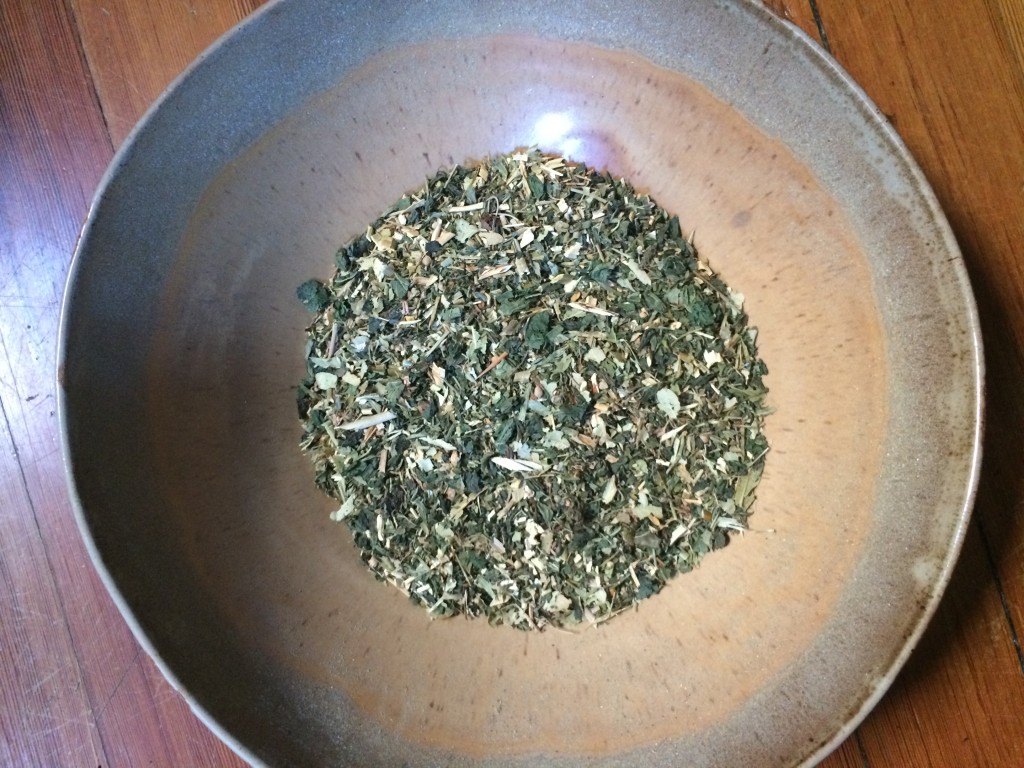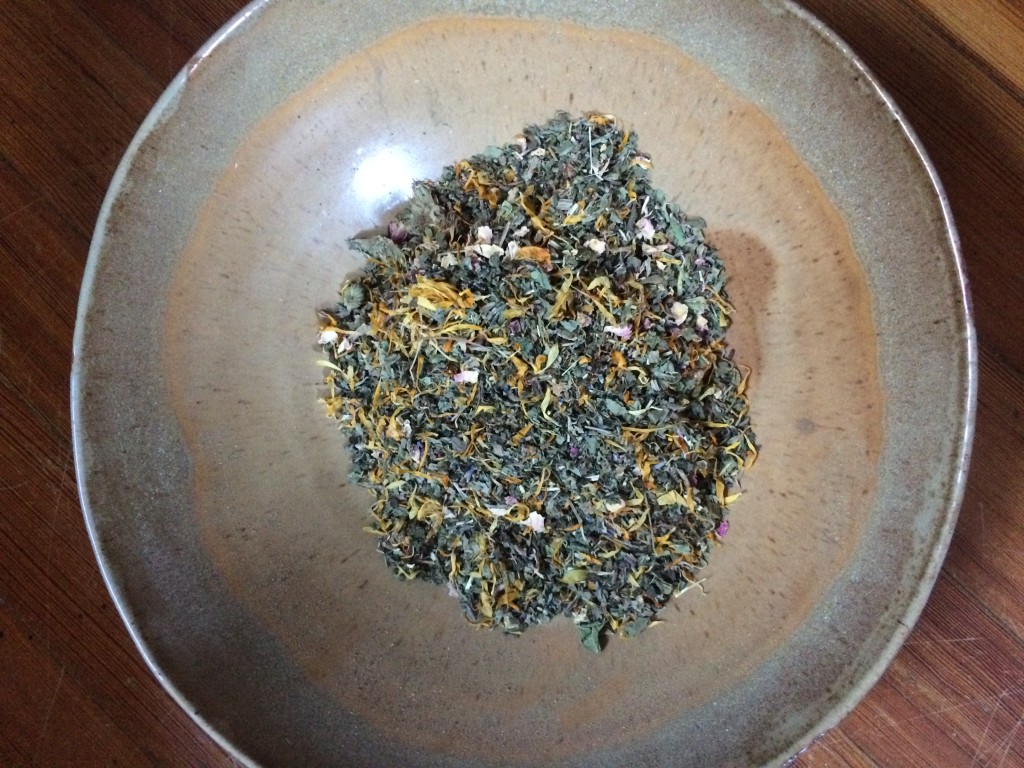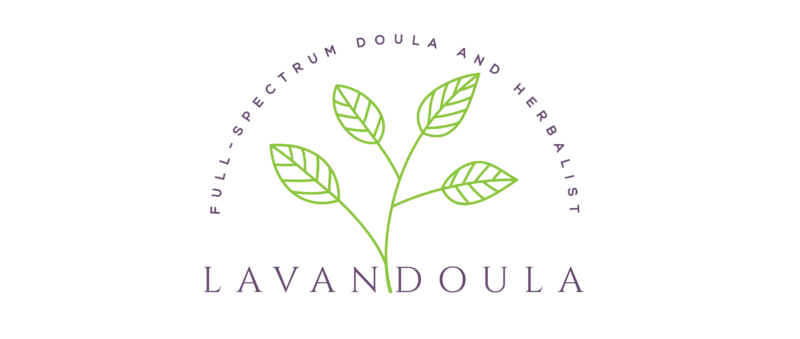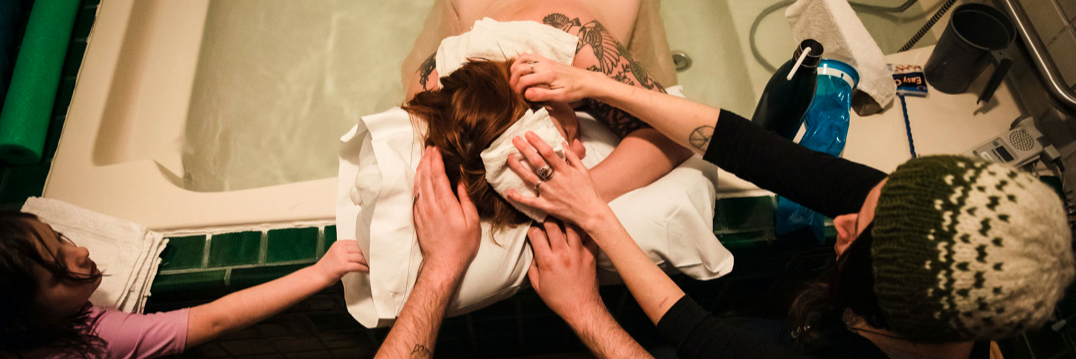I frequently make up batches of nourishing galactagogue herbal tea blends for postpartum clients. Galactagogue is a kooky herbalist term for plants that encourage the production of breast milk. My most recent batch was this:

It contains goat’s rue, nettle, linden (leaf and flower), marshmallow (root), moringa and fenugreek. Should be steeped overnight (or however long you can manage, because really, whatever you manage to do postpartum is appropriate!). Maximum mineral extraction happens the longer the tea is steeped, and the cooled water allows the mucilaginous components of both the linden and marshmallow to come through. These are extra moistening, and extra soothing to frayed nerves of under-slept new parents. Many folks rely on herbs to support nursing, and this blend is much stronger and more effective than its grocery store counterpart. I had a client exclusively breastfeeding her twin boys with the help of a blend like this!
I also made this new mom an herbal postpartum sitz bath:

This recipe includes plantain and comfrey leaves, calendula blossoms, rose petals, lavender flowers and yarrow. I love making these baths because the calendula, rose and lavender give it such beautiful color. Plantain contains the tissue proliferant allantoin, which gently encourages skin to heal (especially nice if stitches were needed). Other herbs encourage healing (yarrow), are antimicrobial (lavender), and gently astringent to tighten and tonify tissue back to its comfortable state. These herbs can be steeped for 20 minutes, like a tea, strained well, and added to a sitz bath or used in a peri-rinse bottle.
My ceramic herb mixing bowl is a product of Liz Kinder pottery. I used to sell her pots when I worked at Wild Indigo Boutique in Boston’s South End.
Herbs for Pregnancy and Birth Workers
Herbs for Pregnancy and Birthworkers
Wednesday, September 16 2015, 7-9pm. $20 (or a donation to the Boston Doula Project)
At the CommonWealth Center for Holistic Herbalism in Brookline, MA
Are you pregnant, or hoping to be, and wondering how to safely and effectively use herbal remedies? Do you work around pregnancy and wish you knew what types of alternatives are good to suggest? Many folks approach midwives, lactation consultants, and doulas for insight on pregnancy and postpartum support herbs. This class, taught by a professional birth doula and herbalist, will help clarify some myths about herbs in pregnancy. (Wait–did Baby Center really just say nettle could cause a miscarriage?) We’ll cover the basics from nourishing uterine tonics and postpartum sitz baths to self-care herbs for birthworkers.
To register, check out the CommonWealth Center website.
As I prepare for my class for Pregnancy and Birth Workers tonight at the CommonWealth Center for Holistic Herbalism, I am looking at my list of materia medica. Some herbs I hope to go over tonight have been previously mentioned in this post. Others, I hope to add to the list as time goes on.
Calendula (Calendula officinalis) – this soothing, lymphatic support herb is great when added to a postpartum sitz bath. I love to use calendula oil on backed-up lymph (like in my neck/behind my ears when I’m getting a cold), or to sooth my belly when I’m feeling bloated.
Goat’s Rue (Galega officinalis) – has been used to support milk production since dairy farmers noticed their goats increased output from eating this common meadow weed. A great breastfeeding herb, and contains chromium, which is a trace mineral helpful for glucose metabolism and curbing sugar cravings!
Marshmallow (Althea officinalis) – a moistening and soothing plant. Cold brew of the root is how you get the most mucilage (nourishing long-chain polysaccharides). I always add a pinch to long-steep lactation tea.
Moringa (Moringa oleifera) – a plant not-at-all native to New England, but often used by nursing mothers in the product “GoLacta”. My opinion is that almost any herb taken in a tea form will be more effective (as many have milk supply issues from simply being dehydrated). Morninga is much cheaper in loose-leaf tea than in the marketed capsules, also.
Milk Thistle (Silybum marianum) – a gentle, trustworthy liver-support herb. Often seen in “mother’s milk” tea blends, but the best way to take the herb is in capsules of the ground up seed. Historically used for nursing support, my theory is this plant supports lactation by helping the liver process the hormonal dump of postpartum reality (cortisol, anyone?)
Plantain (Plantago officinalis) – an edible local weed. Used to soothe bee stings and rashes, support kidneys and heal guts. I always add a little to my postpartum sitz baths.

